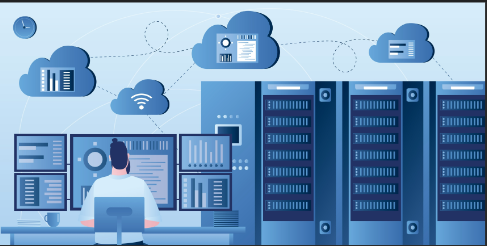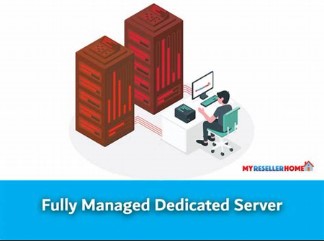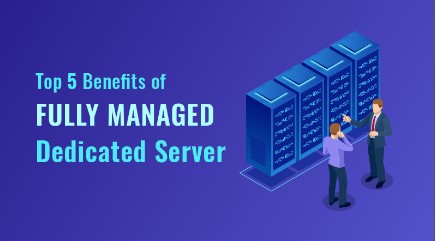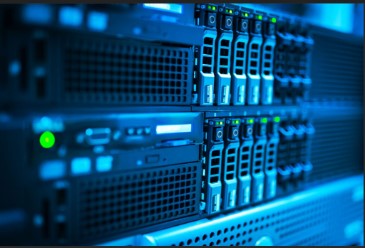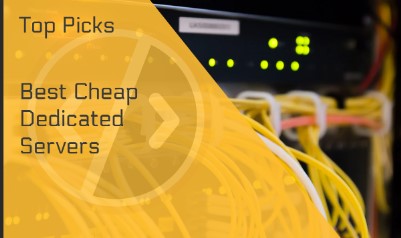Powerful Dedicated Servers
– Defining Powerful Dedicated Servers
– A deep dive into what constitutes a powerful dedicated server, exploring its standalone nature, dedicated resources, and unmatched performance capabilities.
– Why Businesses Need Dedicated Servers
– Examining the critical reasons why businesses of all sizes rely on dedicated servers, from ensuring website uptime and handling high traffic volumes to maintaining security and compliance.
The Mechanics of Dedicated Servers
– How Dedicated Servers Work
– A comprehensive explanation of the underlying technology and infrastructure that enable dedicated servers to function, including network configurations, server management, and data isolation.
– Key Components of a Powerful Dedicated Server
– CPU and Processing Power
– Detailed look at different types of processors, core counts, and how CPU performance affects server operations and application performance.
– RAM and Memory Capabilities
– The importance of RAM in server performance, different types of memory, and how memory size and speed impact server efficiency.
– Storage Solutions: HDD vs. SSD
– Comparing hard disk drives (HDD) and solid-state drives (SSD), their performance differences, cost implications, and use cases.
– Bandwidth and Network Performance
– Exploring bandwidth needs, network speed, and how they contribute to overall server performance and user experience.
Advantages of Using Dedicated Servers
– Superior Performance and Reliability
– How dedicated resources lead to consistent performance, reduced downtime, and improved reliability compared to shared hosting solutions.
– Enhanced Security Measures
– Overview of security benefits, including dedicated firewalls, intrusion detection systems, and custom security configurations that protect sensitive data.
– Customization and Control
– The ability to tailor server settings, software installations, and configurations to meet specific business requirements and optimize performance.
– Scalability to Match Business Growth
– How dedicated servers can be scaled up with additional resources to accommodate business growth and increased traffic demands.
Choosing the Right Dedicated Server
– Assessing Your Business Needs
– Traffic and Resource Demands
– Evaluating current and anticipated traffic levels, resource requirements, and application demands to determine the appropriate server specifications.
– Future Growth Considerations
– Planning for future expansion, including the potential for an increased user base, new applications, and additional services.
– Comparing Different Server Providers
– What to Look for in a Provider
– Key criteria for selecting a hosting provider, such as reputation, customer support, uptime guarantees, and additional services.
– Price vs. Performance Trade-offs
– Balancing cost considerations with performance needs, understanding different pricing models, and evaluating total cost of ownership.
Optimizing Dedicated Server Performance
– Implementing Effective Caching Strategies
– Techniques for caching to reduce load times and server strain, including browser caching, server-side caching, and third-party caching tools.
– Leveraging Content Delivery Networks (CDNs)
– How CDNs can enhance performance by distributing content closer to users, reducing latency, and improving load times.
– Regular Monitoring and Maintenance Practices
– Performance Metrics to Watch
– Key performance indicators (KPIs) to monitor, such as CPU usage, memory usage, disk I/O, and network throughput.
– Proactive Security Measures
– Routine security audits, updates, and patch management practices to maintain server integrity and protect against vulnerabilities.
Dedicated Servers vs. Other Hosting Options
– Dedicated Servers vs. Shared Hosting
– Key Differences and Use Cases
– A side-by-side comparison highlighting the distinct advantages and limitations of dedicated servers versus shared hosting, and scenarios where each is most appropriate.
– Dedicated Servers vs. VPS Hosting
– Pros and Cons of Each
– Comparing dedicated servers to virtual private servers (VPS), analyzing cost, performance, and scalability to help businesses make informed decisions.
– When to Upgrade to a Dedicated Server
– Identifying the signs that it’s time to move from shared or VPS hosting to a dedicated server, including performance bottlenecks, security concerns, and growth demands.
Real-world applications of Dedicated Servers
– E-commerce Websites
– Handling High Traffic and Transactions
– How dedicated servers ensure e-commerce platforms remain fast, reliable, and secure during peak shopping periods and heavy transaction loads.
– Gaming Servers
– Ensuring Low Latency and High Performance
– The critical role of dedicated servers in delivering smooth, low-latency gaming experiences, supporting multiplayer environments, and managing game updates.
– Large-scale Enterprise Applications
– Supporting Complex Operations and Data Processing
– How enterprises leverage dedicated servers for resource-intensive applications, big data processing, and mission-critical operations.
Future Trends in Dedicated Server Technology
Advances in Hardware and Infrastructure
The future of dedicated server technology is being shaped by rapid advancements in hardware and infrastructure.
Next-generation processors are pushing the boundaries of computational power, with innovations such as multi-core and multi-threaded CPUs offering unprecedented levels of performance.
These processors, combined with high-speed RAM and NVMe (Non-Volatile Memory Express) storage solutions, significantly enhance data access speeds and overall server efficiency.
The shift towards NVMe over traditional SATA storage means faster read/write speeds, reduced latency, and improved IOPS (Input/Output Operations Per Second), making dedicated servers more powerful and reliable than ever.
Additionally, the infrastructure surrounding dedicated servers is evolving with the introduction of hyper-converged infrastructure (HCI) systems.
HCI integrates computing, storage, and networking into a single system, simplifying management and scaling. This streamlined approach not only reduces the complexity of server management but also enhances performance and flexibility, allowing businesses to deploy and scale their server environments quickly and efficiently.
The Role of AI and Machine Learning
Artificial intelligence (AI) and machine learning (ML) are transforming the landscape of dedicated server technology.
These technologies are being integrated into server management systems to optimize performance, predict maintenance needs, and enhance security.
AI-driven algorithms can analyze server performance data in real time, identifying patterns and anomalies that might indicate potential issues before they become critical. This predictive maintenance capability reduces downtime and extends the lifespan of server components.
Machine learning models are also being used to dynamically adjust server configurations based on workload demands.
By continuously learning from usage patterns, these models can optimize resource allocation, ensuring that servers run efficiently under varying loads.
This adaptive approach not only improves performance but also reduces energy consumption, contributing to more sustainable server operations.
Sustainable and Green Hosting Solutions
As environmental concerns become increasingly important, the hosting industry is adopting sustainable practices and green technologies.
Future dedicated servers will be housed in eco-friendly data centers designed to minimize environmental impact.
These data centers utilize energy-efficient cooling systems, renewable energy sources, and advanced power management techniques to reduce carbon footprints.
Innovations in server hardware also play a crucial role in sustainability. Energy-efficient processors, low-power memory modules, and solid-state drives are being developed to consume less power while delivering high performance.
The adoption of liquid cooling systems, which are more efficient than traditional air cooling, further reduces energy consumption and enhances the longevity of server components.
Furthermore, some hosting providers are implementing carbon offset programs, investing in renewable energy projects to neutralize their carbon emissions. This commitment to sustainability not only benefits the environment but also appeals to environmentally-conscious businesses seeking green hosting solutions.
Edge Computing and Decentralized Infrastructure
The rise of edge computing is another significant trend shaping the future of dedicated servers. Edge computing involves processing data closer to its source, reducing latency and bandwidth usage.
This decentralized approach enhances the performance of applications that require real-time processing, such as IoT devices, autonomous vehicles, and augmented reality systems.
Dedicated servers are being deployed at the edge of networks, enabling faster data processing and improved user experiences.
This shift towards decentralized infrastructure is driven by the increasing demand for low-latency services and the proliferation of connected devices. As a result, businesses can leverage edge computing to deliver faster, more responsive applications and services.
Serverless Architecture and Automation
The advent of serverless computing and automation is revolutionizing how dedicated servers are managed and utilized.
Serverless architectures allow businesses to run applications without managing the underlying server infrastructure. Instead, server resources are automatically allocated and scaled based on application demands, reducing the need for manual intervention and optimizing resource usage.
Automation tools and platforms are also becoming integral to dedicated server management. These tools streamline deployment, monitoring, and maintenance processes, enabling IT teams to focus on strategic initiatives rather than routine tasks.
Automation enhances efficiency, reduces human error, and ensures that servers operate at peak performance with minimal downtime.
Quantum Computing Integration
Looking further ahead, the integration of quantum computing with dedicated servers holds transformative potential.
Quantum computers can solve complex problems exponentially faster than classical computers, opening new possibilities for data analysis, cryptography, and optimization tasks.
While still in its early stages, the integration of quantum computing with traditional servers could revolutionize industries requiring massive computational power and advanced problem-solving capabilities.
As quantum technology matures, businesses may access quantum-powered servers through dedicated hosting providers, harnessing the power of quantum computing without the need for in-house expertise or infrastructure.
Conclusion
The future of dedicated server technology is marked by significant advancements in hardware, the integration of AI and ML, a focus on sustainability, the rise of edge computing, the adoption of serverless architectures, and the potential of quantum computing.
These trends are driving the evolution of dedicated servers, making them more powerful, efficient, and adaptable to the ever-changing needs of businesses in the digital age.
By staying abreast of these developments, businesses can leverage cutting-edge server technology to gain a competitive edge and support their growth and innovation strategies.
– Advances in Hardware and Infrastructure
– Emerging hardware technologies, such as next-generation processors, NVMe storage, and advancements in server architecture.
– The Role of AI and Machine Learning
– The integration of artificial intelligence and machine learning to enhance server management, predictive maintenance, and performance optimization.
– Sustainable and Green Hosting Solutions
– Innovations in energy-efficient server technology, eco-friendly data centers, and sustainable practices in the hosting industry.
Conclusion
– Summarizing the Importance of Powerful Dedicated Servers
– Recapping the key benefits and critical roles that dedicated servers play in modern business operations.
– Making the Right Choice for Your Business
– Encouraging businesses to assess their specific needs, explore options, and choose the dedicated server solutions that align with their goals and growth strategies.
